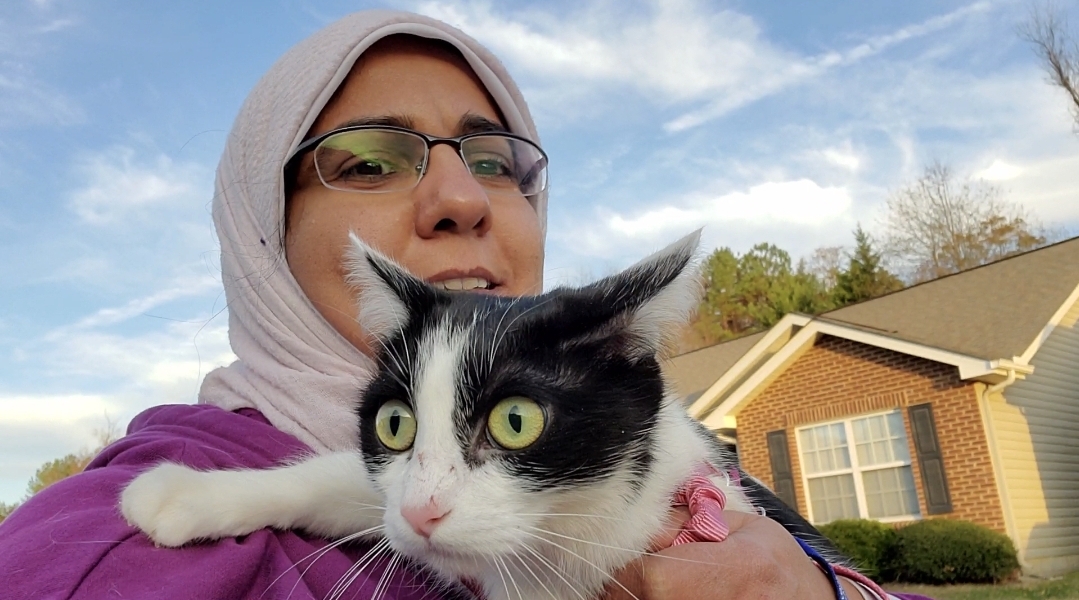
Heba Abdelgaffar, a lab manager in the Jurat-Fuentes Lab, joined the Department of Entomology and Plant Pathology in 2012 after receiving her Ph.D. in biology from Ain Shams University in Cairo. Since her arrival, Heba has contributed to many publications and excelled as a team leader. In her free time, Abdelgaffar loves to foster animals and cook traditional Egyptian dishes.
Q&A with Heba Abdelgaffar
Can you tell me a little bit about yourself?
My name is Heba Abdelgaffar, and I was born and raised in Cairo (Egypt). I have always been interested in science, so I pursued a Ph.D. degree in Biology from Ain Shams University in Cairo. My dissertation project was on identifying receptors for insecticidal proteins from the bacterium Bacillus thuringiensis.
After graduation, I moved to the USA and joined EPP as a Visiting Scholar in the laboratory of Dr. Jurat-Fuentes for six months. Shortly after returning to Egypt, a Postdoctoral Research Associate position became available, and I returned to the Dr. Jurat-Fuentes lab for five years. Since then, my position has changed to Research Associate and more recently, to Laboratory Manager.
Who are the team of faculty you work with?
Dr. Juan Luis Jurat-Fuentes is my supervisor. He is a great leader, and it is an honor to work under him. I am thankful for allowing me to be a part of his team.
What are the primary research areas performed in the lab?
The goal of our research is to improve and develop novel insect control biotechnology for safer and more sustainable food, feed and fiber production. Most projects are focused on insecticidal proteins from the bacterium Bacillus thuringiensis or “Bt”, including projects on their mode of action and mechanisms of insect resistance against Bt proteins.
Another relevant line of research in our laboratory aims at the development of insecticidal gene silencing by RNA interference (RNAi) as a biopesticide and characterizing resistance mechanisms against this technology. Other projects in the lab focus on describing the insect gut defensive response to Bt proteins as a model of gut healing, and screening digestive fluids from insects for enzymes with potential for industrial application, such as cellulases to produce ethanol biofuel from plant biomass and additives to improve livestock nutrition.
How did you get into your career field?
Through my supervisor in Egypt, Dr. Salah Mostafa. He introduced me to the “Bt” field back in 2008, when I was completely clueless about what he was talking about! He suggested that I read some previously published works and if I was interested, join his team. I went home that day and for a whole week, I did nothing but read. Every line opened a door to a whole new world and the more I read the more I became interested in the field of Bt, so I decided to jump in.
What is your favorite procedure to do in the lab?
I like challenges and solving technical problems. If you have something that is not working, you completely have my full attention. One of the great things about scientific research is the suspense – you do your work and you do not know where that will lead you. Every day is a start of a new adventure, and the suspense keeps coming.
What is your favorite part of your job?
The very best part is the satisfaction I feel when the adventure is completed successfully, and the mission is accomplished.
What do you consider to be one of your greatest achievements?
My current work is very novel and involves developing nanobodies to improve biopesticides and transgenic crops. This is work that is resulting in patents and has great potential for application to pest control. It is very rewarding to see how the results of your work can influence the future of plant protection against insect pests.
If someone wanted to get to where you are now, do you have any advice for them?
Read more, try to love what you do, and help and share your knowledge with others.
What are two of your favorite hobbies?
I love fostering animals, especially anything that has the word “cat” in it. My second hobby is cooking, I am usually only interested in Egyptian food, but I am open to trying other cuisines as well.
